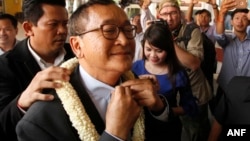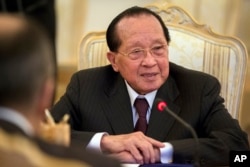A Cambodian court Friday issued an arrest warrant for prominent opposition leader Sam Rainsy over a defamation case brought against him seven years ago.
The warrant is likely to be seen by many as politically motivated, since it comes as Rainsy's longtime rivalry with Prime Minister Hun Sen intensified this week.
The prime minister Thursday threatened legal action after Rainsy suggested the Cambodian People's Party was not committed to holding democratic elections.
Rainsy, who heads the Cambodia National Rescue Party, made the comments during a trip to Japan and South Korea. He had been set to return to Cambodia Monday.
It is not clear whether Rainsy will now come home and face arrest, or flee to self-imposed exile, as he has done in the past when facing long prison sentences.
Defamation case
The defamation case was brought against Rainsy in 2008 by Foreign Minister Hor Namhong, who was upset the opposition leader accused him of being an ex-prison chief for the Khmer Rouge.
That case resulted in a conviction and a two-year jail term. Separately, Rainsy had been sentenced to jail on charges related to the uprooting of border markers on the frontier with Vietnam.
Rainsy never served the jail terms. He later returned home and received an official pardon, allowing him to reenter the political scene. It is not clear what effect, if any, the pardon will have on the current arrest warrant.
The dispute is likely to increase ongoing political tension between the ruling party and the opposition, which are preparing for elections in 2017 and 2018.
The CPP and CNRP agreed in May to stop insulting each other as part of a so called "culture of dialogue," which has been shaken in recent months, in part by violence against opposition lawmakers.
The agreement had represented a rare political concession from Prime Minister Hun Sen, who has ruled the country since 1985.






